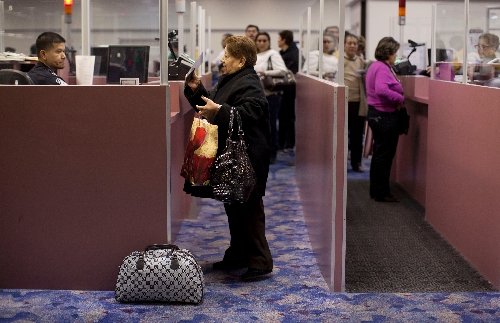Foreign visitors say getting a temporary visa still difficult
Agustina Ocampo is the kind of foreign traveler businesses salivate over.
The 22-year-old Argentine recently dropped more than $5,000 on food, hotels and clothes in Las Vegas during a trip that also took her to Seattle's Space Needle, Disneyland and the San Diego Zoo. But she doubts she will return soon.
"It is a little bit of a headache," said Ocampo, a student who waited months to find out whether her tourist visa application would be approved.
More than a decade after the government strengthened travel requirements after the Sept. 11, 2001, terrorist attacks, foreign visitors say getting a temporary visa remains daunting.
The tourism industry hopes to change that with a campaign to persuade Congress to overhaul the State Department's tourist visa application process.
The Las Vegas Convention and Visitor's Authority and government leaders across the board have endorsed the effort, saying a bigger flow of foreign tourists will help keep businesses open and create jobs in a state with the nation's highest unemployment rate.
"The industries affected by tourism are all behind it," said U.S. Rep. Joe Heck, R-Nev., sponsor of a House bill that would speed visa interviews, among other measures. "We need the jobs."
Jim Evans, a former hotel chief executive officer heading a national effort to promote travel to the U.S., said that "After 9/11, we were all shaken and there was a real concern for security, and I still think that concern exists." At the same time, he said, the U.S. needs "to be more cognizant of the importance of every single traveler."
Tourism leaders said the decline in foreign visitors over the past decade is costing American businesses and workers $859 billion in untapped revenue and at least half a million potential jobs.
While the State Department has beefed up tourist services in recent years, reducing wait times significantly for would-be visitors will likely be a challenge as officials try to balance terrorist threats and illegal immigration with tight budgets that limit hiring.
"Security is job one for us," said Edward Ramotowski, managing director of State's visa services. "The reason we have a visa system is to enforce the immigration laws of the United States."
Anti-immigration proponents argue that allowing more visitors would put the nation at greater risk.
"Everybody would like to find a way to admit as many people as possible to visit here providing that they visit and then go home," said Jessica Vaughan, director of policy studies at the Center for Immigration Studies, an anti-immigration group based in Washington, D.C.
Nearly 7.6 million nonimmigrant visas were issued in 2001, compared with fewer than 6.5 million in 2010. The number of visa applicants also dropped sharply after 2001. Those combined forces pushed the U.S. share of global travelers down to 12 percent last year, from 17 percent before 2001.
The proposed immigration overhaul has largely been driven by the U.S. Travel Association, the tourism industry's lobbying giant, and has been endorsed by business titans such as the National Retail Federation, Four Seasons Hotels and Resorts, and Walt Disney Parks and Resorts. Republicans and Democrats in Congress are backing the proposed changes through six bills in Congress.
Geoff Freeman, the travel association's chief operating officer, said visa interview wait times should be limited to no more than 10 days.
"Every day a person is waiting for that interview is a day a person cannot be here supporting the American economy," he said.
For most foreigners, taking a last-minute business or leisure trip to America would be nearly impossible. The average wait time for a visa interview in Rio de Janeiro, for example, is 87 days, according to the State Department. The Government Accountability Office concluded that wait times are likely much longer than reported because some department employees don't schedule interviews during high-demand periods.
The vast majority of visitors enter through the country's visa waiver program, which allows in travelers from 36 nations without a visa. Travel proponents want to add nations whose residents are unlikely to illegally stay in the U.S., such as Argentina, Brazil, Poland and Taiwan.
Tourists from the rest of the world, including India, China, Mexico, must get a nonimmigrant visa. The process can be expensive and time-consuming.
People must travel to the interview location, not knowing whether they will be approved. Roughly 78 percent of all tourist visas were approved so far in 2011.
Tourism proponents suggest videoconferencing to speed the process, but the department has concerns about safety and technology, Ramotowski said.
In-person interviews weren't the norm before Sept. 11, 2001, when consular officials could grant visas based on an application. Now there are fingerprint checks and facial recognition review of photographs.
The State Department has moved to boost its tourist services in recent years, transferring employees from slow offices to bustling embassies and consular posts and extending the hours of many visa processing centers.
Other proposals include granting more multientry visas, charging premium fees for those who want a visa right away, adding more visa processing officers and allowing applicants to submit paperwork in their native language.
"We can't afford to treat them in a way that gives them an impression that maybe they aren't welcome," said Rolf Lundberg, the U.S. Chamber of Commerce's top lobbyist.
Ocampo, who spent her vacation shopping at upscale boutiques and visiting family in California, said she would be more eager to come back if she knew her business was wanted.
"Everyone wants to visit the Statue of Liberty and Disneyland," she said.

















